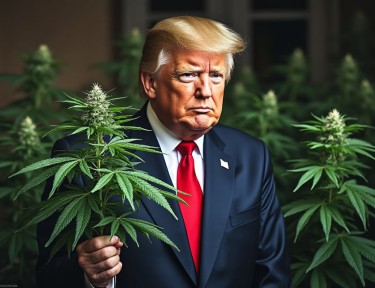Cannabis News
Same Old Banana in the Tailpipe for Marijuana Legalization
Published
1 year agoon
By
admin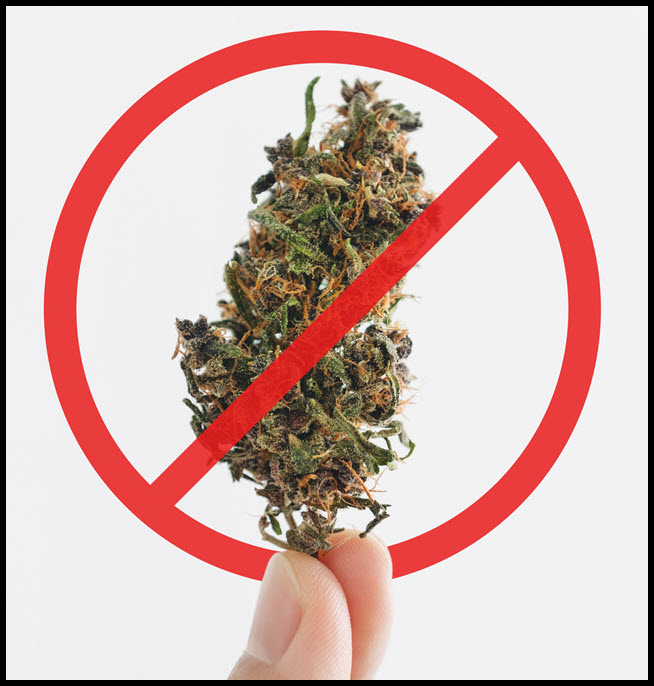
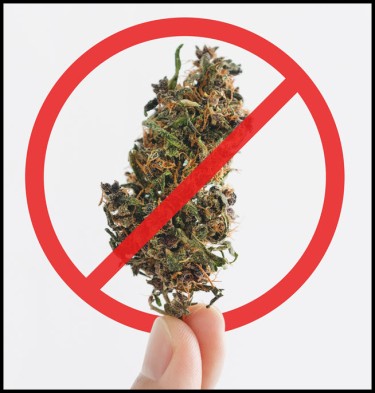
Don’t say you haven’t heard this song before, in fact, over and over, but as Marijuana Moment first reported, the bipartisan efforts to introduce marijuana and psychedelics amendments into a major defense bill faced disappointment as they failed to progress to the floor. Lawmakers from both political spectrums proposed these amendments to be included in the National Defense Authorization Act (NDAA). Despite numerous drug policy amendments being offered, the House Rules Committee, led by Republicans, opted against allowing any of them to advance to floor votes. This decision was made despite the impassioned testimonies of certain sponsors who urged the committee to consider them. In the early hours of Thursday, the committee released a second rule and a list of cleared amendments for the NDAA. The committee had already approved a set of relatively uncontroversial proposals last Tuesday. However, some unrelated amendments on issues like gender-affirming care and support for Ukraine have caused controversy. Advocates held onto hope that the drug policy reform measures would be reconsidered and approved when the committee revisited the bill, but unfortunately, those hopes were dashed.
Bipartisan Lawmakers’ Rejected Amendments Seek to Address Cannabis and Psychedelic Issues in Defense Bill
The proposed amendments covered various critical issues related to cannabis and psychedelics. These included eliminating cannabis drug testing for individuals seeking to join the military, safeguarding federal workers from losing security clearances due to marijuana use, permitting Department of Veterans Affairs (VA) doctors to issue medical cannabis recommendations, allowing servicemembers to use CBD or other hemp-derived products, and exploring the therapeutic potential of certain psychedelics.
Representatives Earl Blumenauer (D-OR) and Barbara Lee (D-CA), the Democratic co-chairs of the Congressional Cannabis Caucus, who sponsored the amendment concerning medical cannabis recommendations for veterans residing in states with legal cannabis, jointly stated on Thursday in response to the GOP’s blockage.
“In promoting equal access to state-legal medical marijuana programs for our veterans and preventing past cannabis use from disqualifying potential military applicants, our amendments enabled bipartisan progress in addressing the impact of the failed war on drugs,” the lawmakers stated.
They expressed deep concern that the Republican majority chose not to address outdated military drug policies, which pose severe challenges in recruitment and retention. These policies deter qualified individuals from joining the armed services or hinder them from enlisting altogether. The lawmakers further emphasised the necessity of allowing equal access to medical marijuana for servicemembers and veterans, a privilege that is already available to most Americans in various states. They firmly believed that the armed services, veterans, and the American public deserve better treatment and support.
Amendments on Psychedelic Research and Cannabis Pilot Program Survive While Others Face Rejection
Rep. Matt Gaetz (R-FL), the sponsor of the amendment to end cannabis testing for military recruits, expressed his disappointment that these amendments did not receive approval for a vote in a statement to Marijuana Moment on Thursday. He highlighted the challenge of living in a gerontocracy within Congress, which often leads to a conservative perspective on drug policy.
The House Armed Services Committee had already linked two marijuana and psychedelics measures to the NDAA’s original text, even though the amendments were rejected.
Rep. Morgan Luttrell (R-TX) has sponsored a bill that would force the defense secretary to conduct a clinical study on the therapeutic potential of psychedelics for active-duty military personnel suffering from PTSD, traumatic brain injury, or chronic traumatic encephalopathy. This is one of the psychedelic measures. Psilocybin, MDMA, ibogaine, or DMT would be studied, and the secretary would be required to report back to Congress on the results of the trials within a year of the law’s passage. Some of the defeated Rules Committee amendments sought to improve this phrase.
Rep. Dan Crenshaw (R-TX), who sponsors similar standalone legislation, sought to have the Rules Committee amend Luttrell’s measure. He claimed that House Armed Services Committee staff had unauthorizedly removed funding provisions and altered the language to require clinical studies instead of clinical trials. However, the panel declined to follow suit, weakening the psychedelics amendment.
On the other hand, a cannabis amendment attached to the bill in the earlier committee calls for a Defense Department medical cannabis pilot program. This initiative would look at the effects that marijuana usage has on the health of veterans and active-duty military personnel who receive VA benefits. Participants in the VA program must suffer from PTSD, depression, or anxiety or have been prescribed pain medication to be eligible.
Marijuana and Psychedelics Amendments Blocked by the House Committee
The committee blocked the advancement of several marijuana and psychedelics amendments. One of the proposed amendments aimed to prohibit the denial of security clearances for defense department workers based solely on their legal use of marijuana at the state level. Another sought to prevent the requirement of drug testing for marijuana as a condition for military enlistment.
Another amendment mandated that the defense department submit its findings from the psychedelics trials to the VA, the U.S. Department of Health and Human Services (HHS), and relevant congressional committees—not just the House Armed Services Committee as stated in the current legislation.
Another amendment was made to prevent the Department of Defense (DOD) from punishing military servicemembers for using CBD or other hemp-derived products. Then, a proposal aimed to allow VA doctors to issue medical cannabis recommendations to veterans living in states where marijuana is legalized for therapeutic purposes.
An amendment required the defense secretary to develop a plan to provide reenlistment waivers to service members who test positive for THC. Another amendment aimed to expand the existing psychedelics study provisions of the bill to create a DOD grant program for funding research on the therapeutic potential of these substances in treating post-traumatic stress disorder (PTSD) and traumatic brain injury (TBI).
In addition to the DOD-led clinical trial on psychedelics already included in the bill, there was a proposal to require the agency to provide a recommendation on the next steps for further exploring the therapeutic use of these substances in its report.
Lastly, there was an amendment expressing the sense of Congress that officials should investigate all potential therapies, including medicinal cannabis or psychedelics, to aid veterans in healing their visible and invisible wounds upon returning home.
Bottom Line
Bipartisan efforts to introduce marijuana and psychedelics amendments into the defense bill, the National Defense Authorization Act (NDAA), faced disappointment as they failed to progress to the floor for a vote. Despite lawmakers from both political spectrums proposing these amendments to address critical issues related to cannabis and psychedelics, the House Rules Committee, led by Republicans, opted against allowing any of them to advance. This decision dashed hopes for drug policy reform measures within the defense bill, leaving advocates and sponsors expressing deep concern for outdated military drug policies and the lack of equal access to medical cannabis for servicemembers and veterans. Despite some unrelated amendments being approved, the rejection of drug policy reforms highlights the challenges and conservatism surrounding drug policy discussions in Congress.
MORE ON BLOCKING WEED LEGALIZATION, READ ON…
You may like
-


Latest Trump Weed Rumor – Trump Will Federally Deschedule and Decriminalize Cannabis, but Not Legalize It
-


Webinar Replay: Post-Election Cannabis Wrap – Smoke ’em if You’ve Got ’em
-


I Had Just One Puff
-


Marijuana firms Eaze, Green Dragon find new life after $10 million capital infusion
-


Get some rest on Modified Grapes—November’s Leafly HighLight
-


Is Kratom Addictive? Understanding Dependence, Risks, and Safe Usage
Cannabis News
Latest Trump Weed Rumor – Trump Will Federally Deschedule and Decriminalize Cannabis, but Not Legalize It
Published
17 hours agoon
November 14, 2024By
admin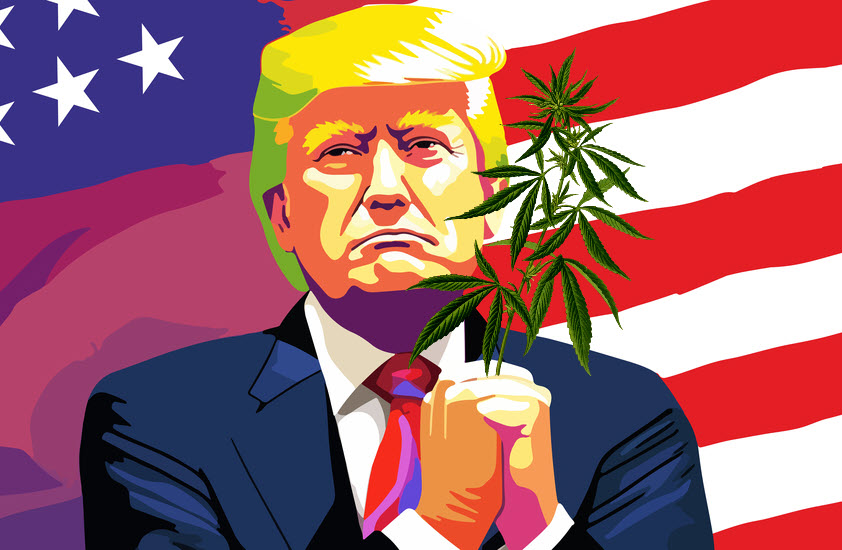
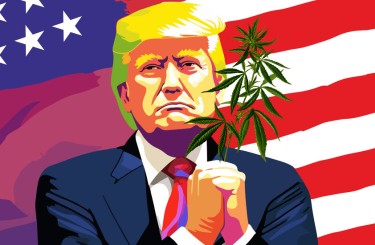
In a recent interview, former New Jersey Governor Chris Christie made headlines by asserting that President-elect Donald Trump will pursue significant reforms in federal policies regarding marijuana and cryptocurrency. As the nation grapples with evolving attitudes toward cannabis and the burgeoning digital currency market, Christie’s predictions have ignited discussions about the potential implications of such changes on both industries. This article delves into Christie’s insights, the current state of marijuana and cryptocurrency regulations, and the broader implications of these anticipated reforms.
The Current Landscape of Marijuana Legislation
Federal vs. State Laws
Marijuana remains classified as a Schedule I substance under the Controlled Substances Act (CSA), which places it in the same category as heroin and LSD. This classification has created a complex legal landscape where states have moved to legalize cannabis for medical and recreational use, while federal law continues to impose strict prohibitions. As of now, over 30 states have legalized marijuana in some form, leading to a burgeoning industry that generates billions in revenue.
Challenges Faced by the Cannabis Industry
Despite its legality in many states, the cannabis industry faces significant hurdles due to federal restrictions. These challenges include:
-
Banking Access: Many banks are hesitant to work with cannabis businesses due to fear of federal repercussions, forcing these businesses to operate largely in cash.
-
Taxation Issues: The IRS enforces Section 280E of the tax code, which prohibits businesses engaged in illegal activities from deducting normal business expenses, leading to disproportionately high tax burdens for cannabis companies.
-
Interstate Commerce: The lack of federal legalization prevents cannabis businesses from operating across state lines, limiting their growth potential.
Chris Christie’s Perspective on Marijuana Reform
Christie, a former presidential candidate known for his tough stance on drugs during his tenure as governor, has evolved his views on marijuana over the years. In his recent statements, he emphasized that Trump is likely to pursue descheduling cannabis, which would remove it from the Schedule I classification. This move would not only provide clarity for businesses operating in legal markets but also open avenues for banking and investment.
Christie highlighted that descheduling would allow for a more regulated market where safety standards could be established, thus protecting consumers. He believes that this approach aligns with a growing consensus among Americans who support legalization and recognize the potential benefits of cannabis use for both medical and recreational purposes.
The Future of Cryptocurrency Regulation = The Rise of Cryptocurrencies
Cryptocurrencies have surged in popularity over the past decade, with Bitcoin leading the charge as the first decentralized digital currency. The market has expanded to include thousands of alternative coins (altcoins), each with unique features and use cases. As cryptocurrencies gain traction among investors and consumers alike, regulatory scrutiny has intensified.
Current Regulatory Challenges
The cryptocurrency market faces several regulatory challenges that hinder its growth and adoption:
-
Lack of Clarity: Regulatory frameworks vary significantly across states and countries, creating confusion for investors and businesses.
-
Fraud and Scams: The rapid growth of cryptocurrencies has led to an increase in fraudulent schemes targeting unsuspecting investors.
-
Consumer Protection: Without clear regulations, consumers are often left vulnerable to risks associated with volatile markets.
Christie’s Vision for Crypto Regulation
Christie believes that under Trump’s leadership, there will be an effort to find a “sweet spot” for cryptocurrency regulation balancing innovation with consumer protection. He argues that overly stringent regulations could stifle growth in this emerging sector while too little oversight could expose consumers to significant risks.
In his view, a balanced regulatory framework would include:
1. Clear Definitions: Establishing clear definitions for different types of cryptocurrencies and tokens to differentiate between securities and utility tokens.
2. Consumer Protections: Implementing measures to protect investors from fraud while promoting transparency within the market.
3. Encouraging Innovation: Creating an environment conducive to innovation by allowing startups to thrive without excessive regulatory burdens.
Christie’s insights reflect a growing recognition among policymakers that cryptocurrencies are here to stay and that appropriate regulations are necessary to foster growth while safeguarding consumers.
Implications of Proposed Reforms
Economic Impact
The potential reforms proposed by Christie could have far-reaching economic implications:
-
Job Creation: Legalizing marijuana at the federal level could lead to significant job creation within the cannabis industry—from cultivation and production to retail sales.
-
Investment Opportunities: Descheduling cannabis would open up investment opportunities for institutional investors who have been hesitant due to federal restrictions.
-
Boosting Local Economies: Legal cannabis markets have proven beneficial for local economies through increased tax revenues and job creation.
Similarly, clear regulations around cryptocurrencies could stimulate investment in blockchain technology and related industries, fostering innovation and economic growth.
Social Justice Considerations
Both marijuana legalization and sensible cryptocurrency regulations have social justice implications:
-
Addressing Past Injustices: Legalizing marijuana could help rectify past injustices related to drug enforcement policies that disproportionately affected marginalized communities.
-
Financial Inclusion: Cryptocurrencies offer opportunities for financial inclusion for those underserved by traditional banking systems, particularly in low-income communities.
Political Landscape
The political landscape surrounding these issues is complex. While there is bipartisan support for marijuana reform among certain lawmakers, challenges remain in overcoming entrenched opposition. Similarly, cryptocurrency regulation has garnered attention from both sides of the aisle but requires collaboration to establish effective frameworks.
Conclusion
Chris Christie’s predictions about President-elect Donald Trump’s approach to federal marijuana descheduling and cryptocurrency regulation suggest a potential shift in U.S. policy that could significantly reshape both industries. As public opinion evolves on these issues, lawmakers have an opportunity to enact meaningful reforms that promote economic growth while ensuring consumer protection. The anticipated changes could foster a more robust cannabis industry that contributes positively to the economy and addresses social justice concerns, while clear regulatory frameworks for cryptocurrencies could encourage innovation and protect consumers in the digital economy. Stakeholders in both sectors are closely watching these developments, eager to see how potential reforms might impact their futures. While the realization of Christie’s predictions remains uncertain, it’s clear that the conversation around marijuana and cryptocurrency regulation is ongoing and far from settled.
TRUMP 2.0 ON CANNABIS REFORM, READ ON…
TRUMP 2.0 ON FEDERAL CANNABIS REFORM – WHAT DO WE KNOW?
Cannabis News
Webinar Replay: Post-Election Cannabis Wrap – Smoke ’em if You’ve Got ’em
Published
2 days agoon
November 13, 2024By
admin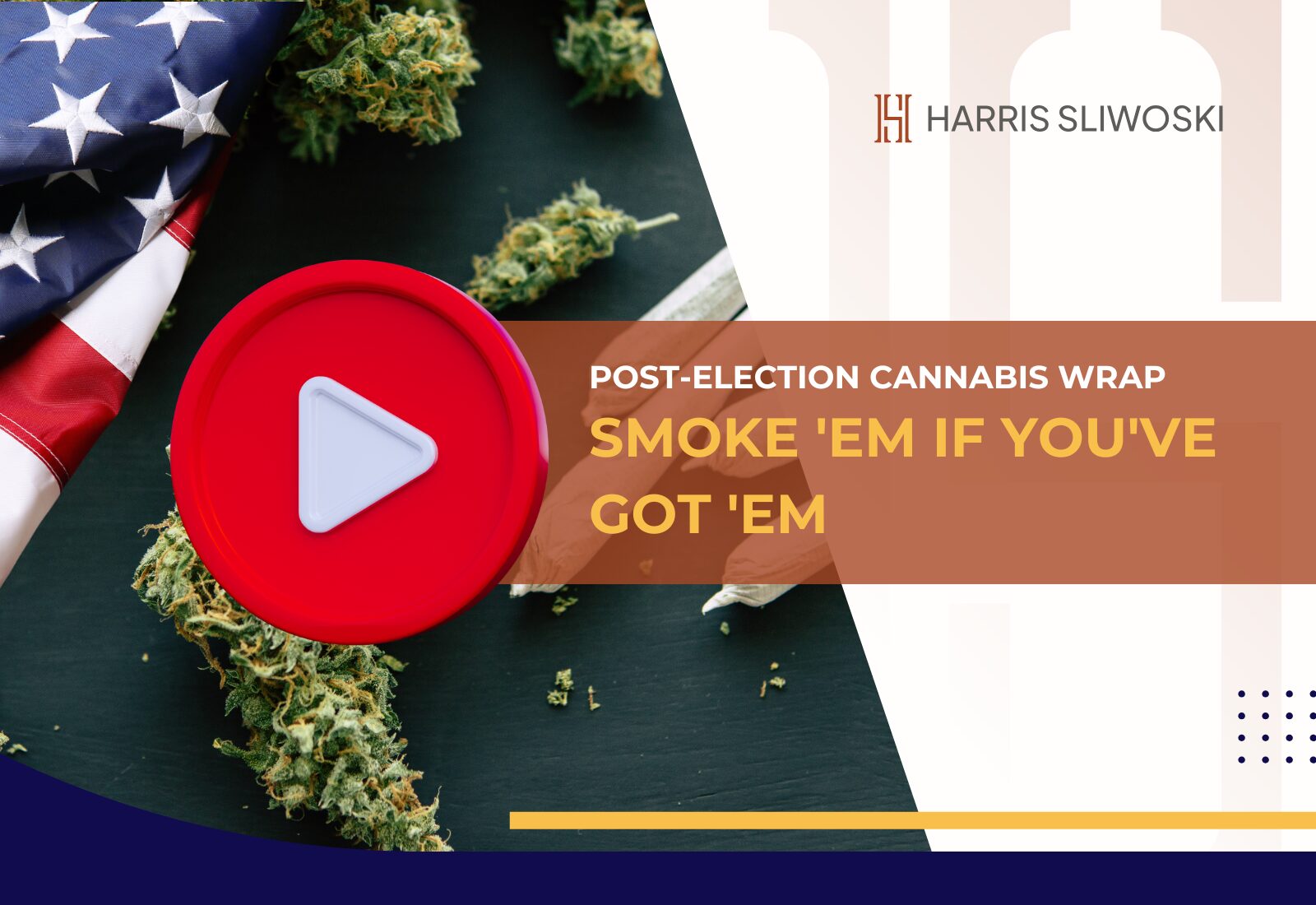
On Thursday, November 7th, Vince Sliwoski, Aaron Pelley and Fred Rocafort held a post election discussion “Post-Election Cannabis Wrap – Smoke ’em if You’ve Got ’em”. Watch the replay!
Key Takeaways from the “Smoke ’em if You’ve Got ’em – 2024 Post Election Cannabis Wrap” Webinar:
- Panelists:
- Vince Sliwoski: Oregon Business lawyer specializing in cannabis and commercial real estate.
- Aaron Pelley: Experienced in cannabis law since Washington’s legalization in 2012.
- Fred Rocafort: Trademark attorney working closely with the cannabis team.
- Election Results Overview:
- Most 2024 cannabis ballot measures did not pass.
- Florida, South Dakota, and North Dakota saw failures.
- Nebraska became the 39th state to legalize cannabis for medical use when it passed two cannabis initiatives, Initiatives 437 and 438.
- Federal and State-Level Developments:
- Medical use is currently legal in 38 states, and 24 states allow recreational use.
- Republican support for marijuana legalization is growing.
- Federal Policy Implications:
- Schedule III Rescheduling: The process to move cannabis to Schedule III is ongoing, which could significantly impact the industry.
- Importance of Federal Appointments: The future of cannabis policy depends heavily on who is appointed to key positions in the administration.
- International and Domestic Trade:
- Schedule III status could ease import/export restrictions on cannabis.
- Unified control of House, Senate, and presidency might expedite legislative progress.
- Economic and Industry Impact:
- Cannabis stocks experienced volatility post-election, reflecting investor uncertainty.
- Federal legalization and banking reforms are crucial for industry stability and growth.
- Future Outlook:
- The potential for federal rescheduling remains strong, with hearings scheduled for early 2025.
- State-level initiatives and regulatory developments will continue to shape the industry.


“How Long Does One Puff of Weed Stay in Your System?”… This topic can be difficult to answer since it is dependent on elements such as the size of the hit and what constitutes a “one hit.” If you take a large bong pull then cough, it might linger in your system for 5-7 days. A moderate dose from a joint can last 3-5 days, whereas a few hits from a vaporizer may last 1-3 days.
The length of time that marijuana stays in the body varies based on a number of factors, including metabolism, THC levels, frequency of use, and hydration.
Delta-9-tetrahydrocannabinol, or THC, is the primary psychoactive component of cannabis. THC and its metabolites, which remain in your body long after the effects have subsided, are detected by drug tests.
Since these metabolites are fat-soluble, they cling to bodily fat molecules. They could thus take a while to fully pass through your system, particularly if your body fat percentage is higher.
THC is absorbed by tissues and organs (including the brain, heart, and fat) and converted by the liver into chemicals such as 11-hydroxy-THC and carboxy-THC. Cannabis is eliminated in feces at a rate of around 65%, while urine accounts for 20%. The leftover amount might be kept within the body.
THC deposited in bodily tissues ultimately re-enters the circulation and is processed by the liver. For frequent users, THC accumulates in fatty tissues quicker than it can be removed, thus it may be detectable in drug tests for days or weeks following consumption.
The detection time varies according to the amount and frequency of cannabis usage. Higher dosages and regular usage result in longer detection times.
The type of drug test also affects detection windows. Blood and saliva tests typically detect cannabis metabolites for shorter periods, while urine and hair samples can reveal use for weeks or even months. In some cases, hair tests have detected cannabis use over 90 days after consumption.
Detection Windows for Various Cannabis Drug Tests
Urine Tests
Among all drug tests, urine testing is the most commonly used method for screening for drug use in an individual.
Detection times vary, but a 2017 review suggests the following windows for cannabis in urine after last use:
– Single-use (e.g., one joint): up to 3 days
– Moderate use (around 4 times a week): 5–7 days
– Chronic use (daily): 10–15 days
– Chronic heavy use (multiple times daily): over 30 days
Blood Tests
Blood tests generally detect recent cannabis use, typically within 2–12 hours after consumption. However, in cases of heavy use, cannabis has been detected up to 30 days later. Chronic heavy use can extend the detection period in the bloodstream.
Saliva Tests
THC can enter saliva through secondhand cannabis smoke, but THC metabolites are only present if you’ve personally smoked or ingested cannabis.
Saliva testing has a short detection window and can sometimes identify cannabis use on the same day. A 2020 review found that THC was detectable in the saliva of frequent users for up to 72 hours after use, and it may remain in saliva longer than in blood following recent use.
In areas where cannabis is illegal, saliva testing is often used for roadside screenings.
Hair Tests
Hair follicle tests can detect cannabis use for up to 90 days. After use, cannabinoids reach the hair follicles through small blood vessels and from sebum and sweat surrounding the hair.
Hair grows at approximately 0.5 inches per month, so a 1.5-inch segment of hair close to the scalp can reveal cannabis use over the past three months.
Factors Affecting THC and Metabolite Retention
The length of time THC and its metabolites stay in your system depends on various factors. Some, like body mass index (BMI) and metabolic rate, relate to individual body processing, not the drug itself.
Other factors are specific to cannabis use, including:
– Dosage: How much you consume
– Frequency: How often you use cannabis
– Method of consumption: Smoking, dabbing, edibles, or sublingual
– THC potency: Higher potency can extend detection time
Higher doses and more frequent use generally extend THC retention. Cannabis consumed orally may remain in the system slightly longer than smoked cannabis, and stronger cannabis strains, higher in THC, may also stay detectable for a longer period.
How Quickly Do the Effects of Cannabis Set In?
When smoking cannabis, effects appear almost immediately, while ingested cannabis may take 1–3 hours to peak.
The psychoactive component THC produces a “high” with common effects such as:
– Altered senses, including perception of time
– Mood changes
– Difficulty with thinking and problem-solving
– Impaired memory
Other short-term effects can include:
– Anxiety and confusion
– Decreased coordination
– Dry mouth and eyes
– Nausea or lightheadedness
– Trouble focusing
– Increased appetite
– Rapid heart rate
– Restlessness and sleepiness
In rare cases, high doses may lead to hallucinations, delusions, or acute psychosis.
Regular cannabis use may have additional mental and physical effects. While research is ongoing, cannabis use may increase the risk of:
– Cognitive issues like memory loss
– Cardiovascular problems including heart disease and stroke
– Respiratory illnesses such as bronchitis or lung infections
– Mood disorders like depression and anxiety
Cannabis use during pregnancy can negatively impact fetal growth and development.
Duration of Effects
Short-term effects generally taper off within 1–3 hours, but for chronic users, some long-term effects may last days, weeks, or even months. Certain effects may even be permanent.
Bottom Line
The amount of time that cannabis remains in your system following a single use varies greatly depending on individual characteristics such as body fat, metabolism, frequency of use, and mode of intake. Frequent users may maintain traces of THC for weeks, whereas infrequent users may test positive for as little as a few days. Hair tests can disclose usage for up to 90 days, while blood and saliva tests identify more recent use. Urine tests are the most popular and have varying detection durations. The duration that THC and its metabolites are detectable will ultimately depend on a number of factors, including dose, strength, and individual body chemistry.
PEE IN A CUP COMING UP, READ ON..

Latest Trump Weed Rumor – Trump Will Federally Deschedule and Decriminalize Cannabis, but Not Legalize It

Webinar Replay: Post-Election Cannabis Wrap – Smoke ’em if You’ve Got ’em

I Had Just One Puff

Marijuana firms Eaze, Green Dragon find new life after $10 million capital infusion

Get some rest on Modified Grapes—November’s Leafly HighLight

Is Kratom Addictive? Understanding Dependence, Risks, and Safe Usage

New Rule, December 5: Oregon Cannabis Retailers, Processors and Labor Peace Agreements

The CBD Dog Treat Guide

Trippin’ Golf Balls – Can Magic Mushrooms Help Your Golf Game?

Australian Broadcasting Corp Alleges Military Veterans Have Been Targeted By Medicinal Cannabis Companies Via Social Media & Offered Free “Product”

Distressed Cannabis Business Takeaways – Canna Law Blog™

United States: Alex Malyshev And Melinda Fellner Discuss The Intersection Of Tax And Cannabis In New Video Series – Part VI: Licensing (Video)

What you Need to Know

Drug Testing for Marijuana – The Joint Blog

NCIA Write About Their Equity Scholarship Program

It has been a wild news week – here’s how CBD and weed can help you relax

Cannabis, alcohol firm SNDL loses CA$372.4 million in 2022

A new April 20 cannabis contest includes a $40,000 purse

Your Go-To Source for Cannabis Logos and Designs

UArizona launches online cannabis compliance online course
Trending
-

 Cannabis News2 years ago
Cannabis News2 years agoDistressed Cannabis Business Takeaways – Canna Law Blog™
-

 One-Hit Wonders2 years ago
One-Hit Wonders2 years agoUnited States: Alex Malyshev And Melinda Fellner Discuss The Intersection Of Tax And Cannabis In New Video Series – Part VI: Licensing (Video)
-

 Cannabis 1012 years ago
Cannabis 1012 years agoWhat you Need to Know
-

 drug testing11 months ago
drug testing11 months agoDrug Testing for Marijuana – The Joint Blog
-

 Education2 years ago
Education2 years agoNCIA Write About Their Equity Scholarship Program
-

 Cannabis2 years ago
Cannabis2 years agoIt has been a wild news week – here’s how CBD and weed can help you relax
-

 Marijuana Business Daily2 years ago
Marijuana Business Daily2 years agoCannabis, alcohol firm SNDL loses CA$372.4 million in 2022
-

 California2 years ago
California2 years agoA new April 20 cannabis contest includes a $40,000 purse





